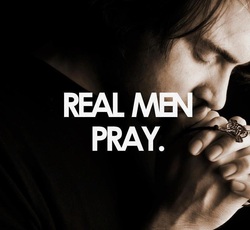
Prayer-speak is especially prevalent among worship leaders.
Prayer speak silences men. Guys who might otherwise pray aloud are intimidated because they don’t know the “prayer code.”
A guy might be tempted to open his mouth and say, “God, I got a problem.” But he keeps quiet because his oration doesn’t sound holy enough.
The other problem with prayer-speak is that it makes our prayers sound rather wimpy. Here is a prayer I heard recently from a musician as he closed his first set:
Dear God, we need you. God, we just need your love. God, we just need your presence. Father be with us in this time of worship. Lord just send your spirit so that every heart is touched. Father, that no one would go home the same.
Lord, I just pray that we would run into your arms and seek safety there. Father nothing compares to your love for us.
Father God we just pray that we would honor you in all we do. Lord, give us boldness to proclaim your word to every nation. Father make us your witnesses unto the ends of the earth. We just pray that your Word would go out into the world and change lives.
Father we just ask all these things in Jesus’ name. Amen.
Does this sound familiar? You probably heard something like it last Sunday.
I don’t really have a problem with what the prayer said. It’s how it was said.
Notice the prayer invoked the name of God twelve times – at the beginning of each sentence. This is just odd. Did Jesus instruct us to repeat God’s name over and over when we pray? When we speak to a flesh-and-blood person do we say their name each time we open our mouths? “Jeremy, thanks for having lunch with me. Jeremy, what will you be ordering? I’m thinking about the tilapia, Jeremy. Jeremy, can you pass the salt?”
And what’s with the frequent use of the word just? Placing a just before a verb softens it. It gives our prayers the sound of a beggar. Would you just give me a crust of bread, God? Lord, I’m just a miserable sinner, just begging you for some little thing.
We are God’s sons, not his slaves. John Wesley said, “Storm the Throne of Grace and persevere therein, and mercy will come down.” We should enter his presence with appropriate confidence. The tone of our prayers should reflect our place as God’s beloved children. Jesus was bold and familiar with his Father; we should be too.
Let’s reimagine the prayer above:
Lord, in the next hour we’re going to set aside all our worries and burdens and ask you to take care of those. We want to focus on what’s really important, but we’re so easily distracted by things that don’t matter. Forgive us for that.
We’re a needy people. We are nothing without you and your Spirit. We get beat up by life all week long, and we need this time with you. Thanks for loving us.
And we know you have a mission for us. You called us to be your witnesses, but we’re scared. We shouldn’t be – but we are. Next time we have an opportunity to speak up for you, fill us with your power.
We really look forward to this time in your presence. Speak to us now. In Jesus’ name. Amen.
Feel the difference between the two prayers? They say basically the same things, but the second prayer sounds confident. You feel it in you gut. It’s not repetitive, hesitant or sing-songy. It’s surprising in its candor. It’s not stuffed with the usual churchy phrases.
Guys, we need to start modeling boldness in prayer. The next time you have an opportunity to pray aloud in a group I challenge you to do three things:
- Invoke the name of God once, at the beginning.
- Don’t place the word “just” before the verbs.
- Speak to God as if he’s a real person. Make your prayer as conversational and “normal” as possible.
This post was written by David Murrow. You can find the original post here: http://churchformen.com/discipling-men/how-to-pray-aloud-like-a-man/
BE HOLY.
BE A MAN.









 RSS Feed
RSS Feed